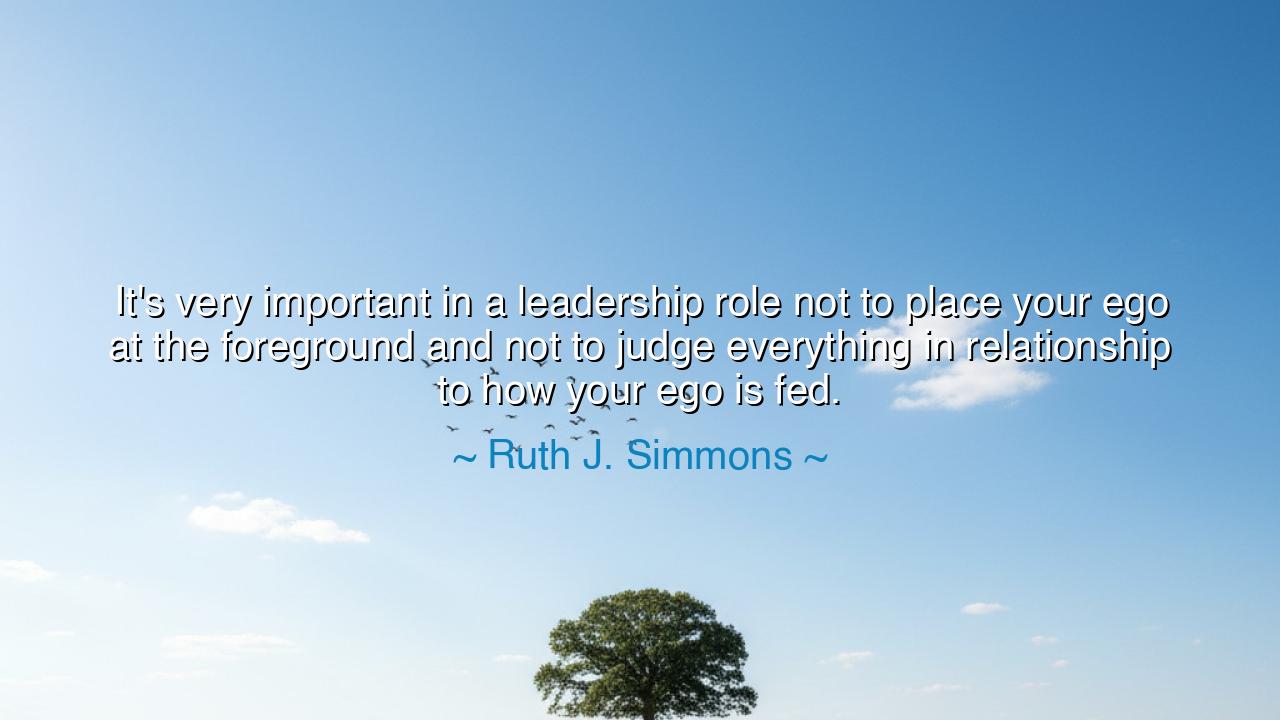
It's very important in a leadership role not to place your ego at
It's very important in a leadership role not to place your ego at the foreground and not to judge everything in relationship to how your ego is fed.






Hear the wise words of Ruth J. Simmons, a trailblazer in education and leadership, who declared: “It’s very important in a leadership role not to place your ego at the foreground and not to judge everything in relationship to how your ego is fed.” In this saying is revealed a truth that has guided the greatest leaders across history: that true power is not measured in the swelling of self, but in the service of others. For the ego, when enthroned, becomes a tyrant, but when humbled, becomes a servant to vision, justice, and the good of the people.
From the earliest days, the ancients warned of the dangers of the ego. In Greek tragedy, hubris—pride swollen beyond measure—was the flaw that brought kings to ruin. Oedipus, Creon, Agamemnon—each fell because they placed their pride above wisdom, their ego above truth. Simmons speaks with this same timeless insight: a leader who measures decisions only by how they magnify their own image will inevitably lead their people into folly. For the throne built on pride is fragile, but the throne built on humility is unshakable.
Consider the story of Marcus Aurelius, the Roman emperor who commanded the vast legions of an empire yet wrote in his Meditations: “Do not waste what remains of your life in thoughts about others, when you are not referring your thoughts to some object of common utility.” He reminded himself daily to resist the temptations of vanity, to act not for the feeding of his ego, but for the welfare of his people. In this, he preserved both his empire and his legacy. Contrast this with the fall of Nero, whose thirst for admiration led him to cruelty, extravagance, and madness, until even Rome itself turned against him. One placed humility above ego; the other placed ego above all.
Simmons’ words also strike against the subtle chains that ensnare modern leaders. The applause of crowds, the allure of titles, the endless craving for recognition—these are the food of the ego, but they poison the spirit of leadership. When a leader acts only to be praised, their choices are no longer guided by wisdom but by vanity. They become like a tree that bends toward every wind, seeking the sun of admiration, rather than standing firm in the soil of truth. The result is mistrust, instability, and eventual collapse.
Yet humility does not mean weakness. To set aside the ego is not to erase the self, but to discipline it. The humble leader still has confidence, vision, and courage, but these are turned outward—to lift others, to heal divisions, to guide the community. This is the strength of servant leadership, the paradox of greatness: that those who make themselves small for the sake of others are the ones remembered as truly great. Ruth J. Simmons knew this truth deeply, for her own path was marked not by self-exaltation but by service to students, to learning, and to the cause of justice.
The lesson for us, O seeker, is clear: beware of the ego when you rise to positions of responsibility. Do not seek leadership to feed yourself, but to serve others. When you make decisions, ask not, “How does this make me appear?” but rather, “How does this serve the greater good?” Practice humility in speech, generosity in judgment, and restraint in glory. In doing so, you will win something greater than applause: you will win trust, the foundation of all true leadership.
Thus, let Simmons’ words endure as a guiding flame: the role of a leader is not to magnify the self, but to magnify the cause entrusted to them. The ego is a poor master but can be a faithful servant if disciplined. Keep it behind you, not before you. Then your path will not be clouded by vanity, and your legacy will not be stained by pride. Instead, you shall stand as the ancients praised: not as a tyrant adored for a moment, but as a wise shepherd remembered for generations.






AAdministratorAdministrator
Welcome, honored guests. Please leave a comment, we will respond soon